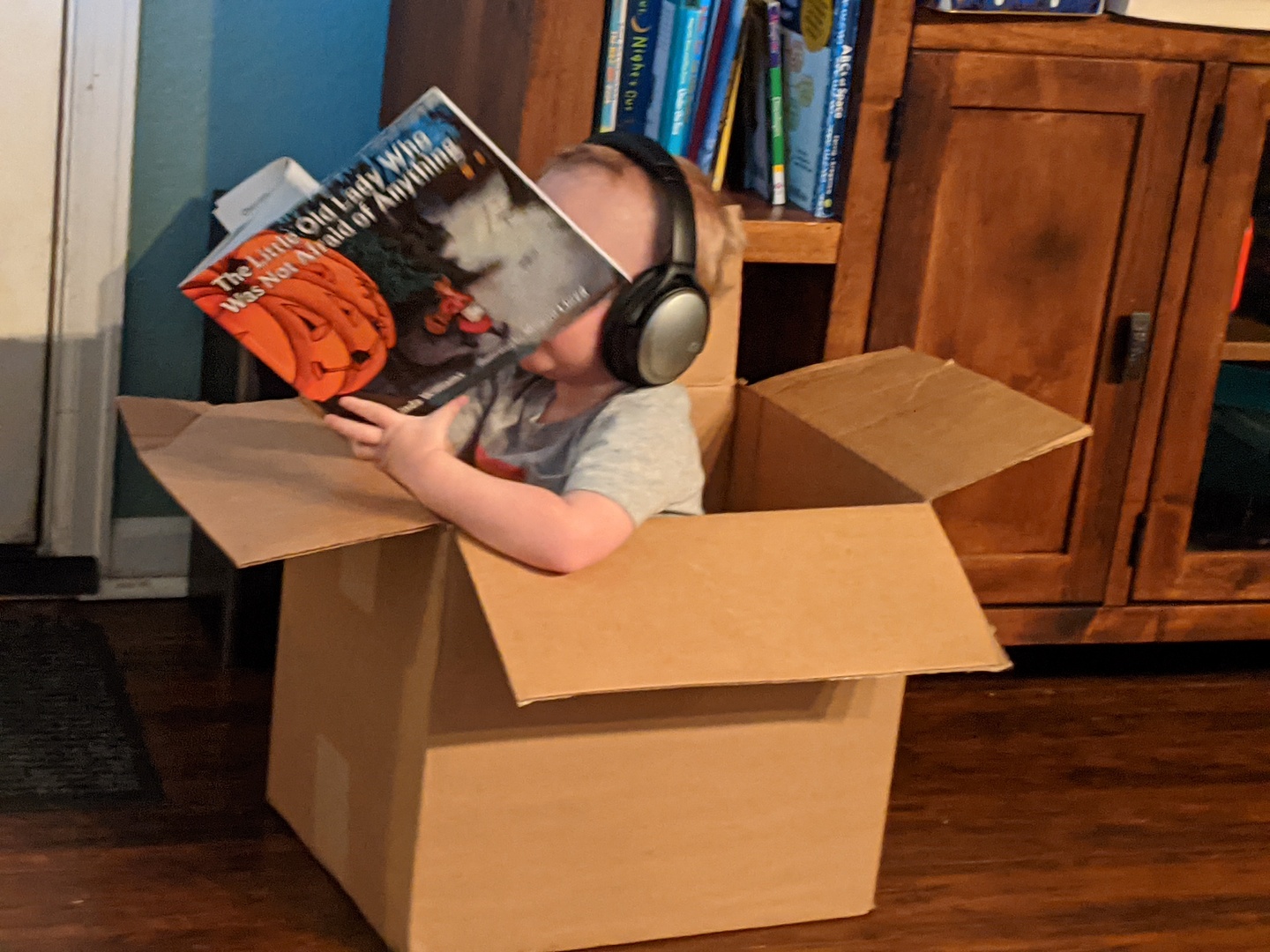By Markie February 21, 2023

Have you heard about the terrible twos? This age does not have to be terrible; though at times, you might be terrified. Yes, two year olds can be tiny tyrants: demanding their way and saying “no” to everything. They’re also incredibly curious and silly. If you can meet their curiosity with wonder and their silliness with fun, you’ll both have a great time.
At two years old: Your kiddo should be walking confidently and learning to run, too; walking up and down stairs holding on to a rail; and climbing up and down on furniture. They should be feeding themselves with spoons and forks and drinking from an open cup. You know what else is a milestone at this age? Defiance. Your little one telling you no and running away shows their developing independence. Now, your kiddo knows the names of most things and is combining words into 2 word (and longer) phrases.
How do you play with a 2 year old? There are so many ways. Kids are learning to pretend and tell imaginative stories. Two is time for tea parties, pirate play, and creating art. Of course, your two year old will still play with all the toys from their toddler days (link to blog).
Here are a few of our favorite toy ideas for your terrific two year old:
-
Blocks
Building blocks are perfect for children of all ages. Most kids are builders, but all kids are knocker-downers. Which does your child find most fun? Do they like to build something to admire or add little character toys or animals to play within their castle, house, etc.? Or do you see that sparkle in the eyes as they knock it all down? There’s no wrong way to play, and these open-ended toys will last as long as your child’s interest (i.e. years and years and years). You can encourage your child to build to their heart’s content: towers, houses, and even bridges and so much more. There are tons of different types of blocks: wooden ones are great; Duplos are bigger legos that kids love at this age. Mega blocks are large interlocking blocks that allow young children to stack blocks pretty high. All of these types of blocks offer great opportunities for open-ended play.
Develops: fine motor skills, gross motor skills, hand-eye coordination, social-emotional development, problem-solving skills
-
Tea set
Tea parties are a great way for kids to use their imagination and develop social skills. A tea set is perfect for pretend play and encourages children to share and take turns. Your 2 year old can have a tea party with stuffed animals, dolls, or even Mom and Dad or siblings! You can try putting some water in the tea pot and let your child practice pouring into cups which is a great independence skill for this age.
Develops: social-emotional skills, fine motor skills, turn-taking, pretend play
-
Balls
Balls are great for any age. Now your capable little tyke will be able to throw the ball overhand, maybe catch a ball, kick it, roll it, bounce it. All the things really. They will love playing a ball game with you most of all. If you have a little basketball goal, great! If not, any bucket will do for tossing a ball into. Same for soccer; if you’ve got a goal, awesome. If not, just put some cones or rocks out to mark goals. Balls don’t have to be outdoor only toys. You can find soft ones or small ones to play with inside. Remember to practice turn-taking games. Don’t put on your soccer coach hat just yet, remember that playing is about having fun!
Develops: Gross motor skills, fine motor skills, turn-taking, problem-solving
-
Ball/car maze
Ball and car mazes differ slightly in design, but both options are great for a 2 year old’s hand-eye coordination and problem-solving skills. For the ball maze, children are able to knock the balls down into a hole and watch them go through the maze, or some mazes even return the ball to the beginning to start over again. There are millions of options for car mazes. Kids tend to love tracks that go around in circles and being able to put 2 cars on the maze and race. Children can watch as the balls or cars travel through the maze. Imagine all the ways your child is learning about the world: things don’t move unless you push them; things go faster downhill; they’re learning about gravity every time that they drop something and watch it go.
Develops: vision tracking, fine motor, gross motor, language, problem-solving, science exploration
-
Costumes
You gotta love the drama. Dressing up in costumes is a great way for children to use their imagination and develop social skills. Encourage your child to be whoever they want to be – a superhero, a princess, or even a chef! Costumes also provide opportunities for role-playing and pretend play. Not only that, kids can practice taking on and off costumes which fosters their independence.
Develops: fine motor skills, self-help skills, independence, play skills, language, pretend play, imagination, social-emotional
-
Doctor kit
Of course, this one could go under costumes, but a doctor kit is a classic toy for good reason. A doctor kit is a great way for children to learn about the human body and develop empathy. There are usually several doctor utensils that children can learn about. Practicing using doctor’s toys with you can make your child feel more at ease at their next doctor’s visit.Your child will learn about empathy as they take care of you or a baby doll or stuffed animal. Role playing things that really happen in their life is so engaging for a child this age. You can help them wrap up a hurt arm in Ace bandage or apply the always popular band-aid. Talk about the parts of their bodies as they play.
Develops: social-emotional, fine motor, self-help skills, pretend play, language, imagination
-
Play tools
Play tools are perfect for children who love to help around the house. These toys help develop hand-eye coordination and problem-solving skills. Children can use play tools to fix things around the house or even build their own creations. You never knew so many things in your home were falling apart. Give your 2 year old a hammer, a wrench, and a screwdriver and they will “fix” everything: your cabinets, bookshelves, chairs, etc. Maybe we should take these tools outside! A great idea! Now, they can hammer the bricks outside and the sidewalk. They might take a saw to the trees outside.
Develops: fine motor coordination, pretend play, language, self-help, independence
-
Puzzles
I’ve been wanting someone to put together this 1000 piece puzzle. Umm… no. Start with simple puzzles and work your way up to more complex ones. The simplest puzzles have pieces in the shape of items, such as: fruits, animals, vehicles, etc. Some puzzles have a frame around the edge, and the pieces interlock on the inside. For an even bigger challenge: some puzzles do not have a frame or outline, and the piece shape is not related to the picture. Save the most challenging puzzles until your 2 year old is a little older.
Develops: cognitive, hand-eye coordination, perseverance, problem solving
-
Art supplies
Maybe your baby is the next Picasso. Art is a wonderful way for children to express themselves and develop fine motor skills. Provide your child with crayons, markers, paint, and paper to encourage creativity. You can also introduce different textures and materials such as stickers, and if you are very brave: glitter. Doing crafts exposes children to different sensory experiences. If you’re worried about a mess, check out water-based markers and paintbrushes which only draw on special paper.
Develops: sensory, fine motor, creativity, social-emotional
-
Play-doh
Yeah, I said it. I love play-doh. Kids love play-doh. You can buy it from the store, or there are recipes online that can be made very easily. DIY allows you to pick the perfect color or even add a scent. Kids love to play with play-doh. They can roll, smash, squish, cut, and then do it all over again. If you’re worried about a mess, try giving your child play-doh in their high chair; hopefully, most of the mess can stay on the tray. If not, just know that some of the best play has a mess factor.
Develops: fine motor, sensory, independence, science exploration
